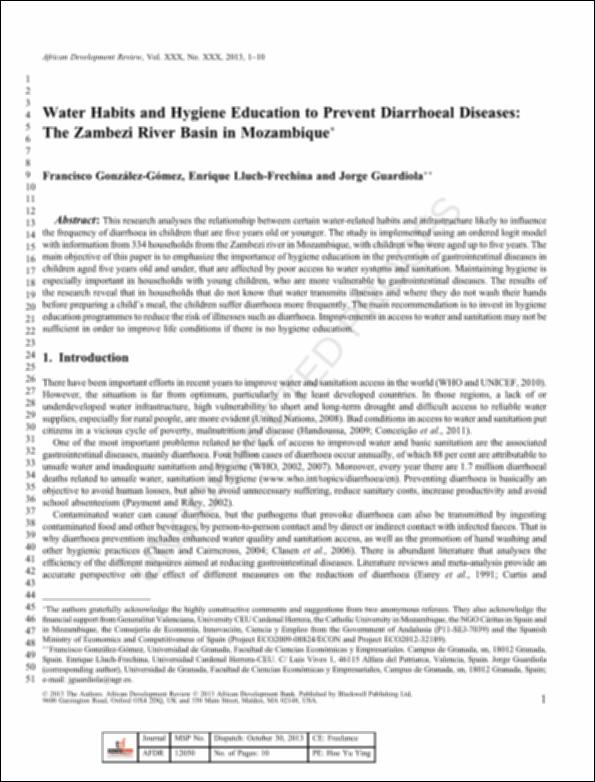Please use this identifier to cite or link to this item:
http://hdl.handle.net/10637/7076Water habits and hygiene education to prevent diarrhoeal diseases: the Zambezi River basin in Mozambique
| Title: | Water habits and hygiene education to prevent diarrhoeal diseases: the Zambezi River basin in Mozambique |
| Authors : | González Gómez, Francisco Lluch Frechina, Enrique. Guardiola Wanden-Berghe, Jorge |
| Keywords: | Water-supply - Mozambique.; Health promotion - Mozambique.; Diarrhea, Infantile - Prevention - Mozambique.; Children - Health and hygiene - Mozambique.; Intestines - Diseases - Prevention - Mozambique.; Educación sanitaria - Mozambique.; Hygiene - Mozambique.; Water - Pollution - Mozambique.; Health education - Mozambique.; Agua - Contaminación - Mozambique.; Agua - Control de calidad - Mozambique.; Water - Purification - Mozambique.; Agua - Depuración y tratamiento - Mozambique.; Diarrea infantil - Prevención - Mozambique.; Intestinos - Enfermedades - Prevención - Mozambique.; Niños - Cuidados e higiene - Mozambique.; Promoción de la salud - Mozambique.; Agua - Abastecimiento - Mozambique.; Higiene - Mozambique.; Water quality management. |
| Publisher: | John Wiley & Sons. |
| Citation: | González-Gómez, F., Lluch-Frechina, E. & Guardiola, J. (2013). "Water habits and hygiene education to prevent diarrhoeal diseases: the Zambezi River basin in Mozambique". African Development Review, vol 25, n. 4, pp. 563-572. DOI: http://dx.doi.org/10.1111/1467-8268.12050 |
| Abstract: | This research analyses the relationship between certain water‐related habits and infrastructure likely to influence the frequency of diarrhoea in children that are five years old or younger. The study is implemented using an ordered logit model with information from 334 households from the Zambezi river in Mozambique, with children who were aged up to five years. The main objective of this paper is to emphasize the importance of hygiene education in the prevention of gastrointestinal diseases in children aged five years old and under, that are affected by poor access to water systems and sanitation. Maintaining hygiene is especially important in households with young children, who are more vulnerable to gastrointestinal diseases. The results of the research reveal that in households that do not know that water transmits illnesses and where they do not wash their hands before preparing a child’s meal, the children suffer diarrhoea more frequently. The main recommendation is to invest in hygiene education programmes to reduce the risk of illnesses such as diarrhoea. Improvements in access to water and sanitation may not be sufficient in order to improve life conditions if there is no hygiene education. |
| Description: | Este es el pre-print que se ha publicado de forma definitiva en http://onlinelibrary.wiley.com/doi/10.1111/1467-8268.12050/abstract This is the pre-peer reviewed version of the following article: González-Gómez, F., Lluch-Frechina, E. & Guardiola, J. (2013). "Water habits and hygiene education to prevent diarrhoeal diseases: the Zambezi River basin in Mozambique". African Development Review, vol 25, n. 4, pp. 563-572., which has been published in final form at http://dx.doi.org/10.1111/1467-8268.12050. This article may be used for non-commercial purposes in accordance with Wiley Terms and Conditions for Use of Self-Archived Versions." |
| URI: | http://hdl.handle.net/10637/7076 |
| Rights : | http://creativecommons.org/licenses/by-nc-nd/4.0/deed.es |
| ISSN: | 1017-6772. |
| Issue Date: | 1-Dec-2013 |
| Center : | Universidad Cardenal Herrera-CEU |
| Appears in Collections: | Dpto. Economía y Empresa |
Items in DSpace are protected by copyright, with all rights reserved, unless otherwise indicated.


